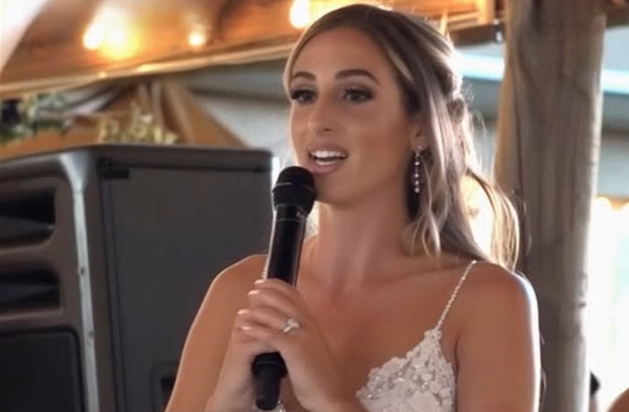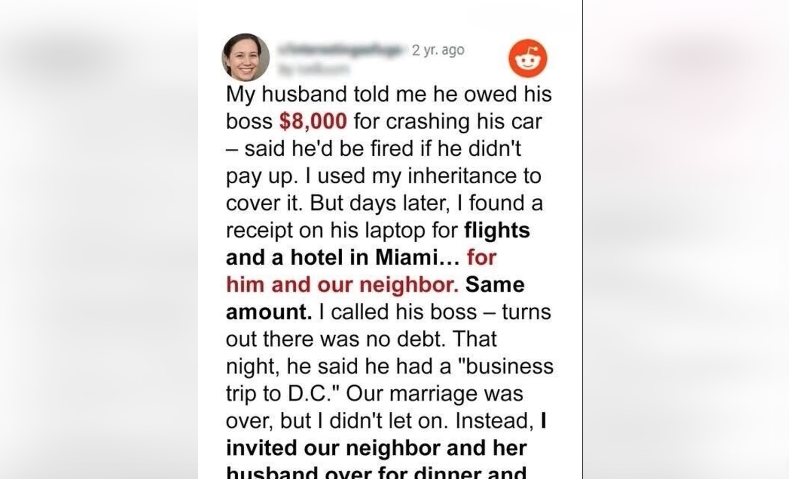The reception space was infused with a luminous late-afternoon glow that seemed determined to linger—golden lamps traced intricate patterns across the ceiling like newly formed constellations, the smooth sound of brass music mingled with the chime of drinking glasses, and the soft murmur of beloved voices filled the hall. My husband stood near the bar, his laughter echoing with his closest friends from university days. My mother shared a table with her sisters, experiencing a sweet, joyful weeping while making a valiant effort to appear perfectly composed. Meanwhile, at our reserved table, Daniel’s tie was slightly askew, his hands possessed their customary precision, as he methodically creased his napkin into a flawless geometric triangle, a ritual he’d performed at every boisterous family gathering for two decades.
The Unexpected Announcement
I had a succinct tribute tucked inside my handbag. It contained straightforward expressions of gratitude. The most heartfelt of these was reserved for the man whose steadfastness had made the entire occasion possible. I started to rise, reaching for the folded paper—when my biological father preemptively stood up, the wine in his glass sloshing perilously close to the brim. “Would anyone object if I offered a few words?” he asked the assembled guests, his volume sufficient to command silence. A scatter of lukewarm applause followed. He raised his glass even higher, swaying perceptibly on his heels. “From the moment she entered the world,” he declared to the room, “I held the dream of providing her with a truly magnificent wedding. And today, I made that dream a reality. That is, after all, the fundamental role of a father.” The statement settled heavily in the air, creating an unpleasant resonance. My fixed smile dissolved. The music, the decorative lighting, the buoyant camaraderie—all the elements of the celebration receded, and I felt abruptly transported back to my six-year-old self, standing on the kitchen linoleum while my mother cradled my face in her palms and told me we would be an exclusive duo for a while. He had departed long before. There was no written farewell, no formal explanation. Only an enveloping hush that consumed the household.
The Empty Spaces
He initiated contact sporadically following his departure. In a particularly good year, I might hear from him twice. He remembered to call on Christmas if the date happened to cross his mind. He’d occasionally recall my birthday if it hadn’t completely slipped his attention. One particular year, he sent a financial draft that the bank failed to honor; the teller’s unspoken sympathy felt substantially worse than the resulting overdraft penalty. He remained absent for all the milestones that truly mattered: my inaugural dance recital (where I embodied a vibrant sunflower), the science project volcano that sadly fizzled out instead of dramatically erupting, the night I wept with such intensity that my pillowcase became soaked, and my mother remained by my side, gently stroking my hair until the morning light. He did eventually appear on a social media feed. “So very proud of my daughter!” he publicly commented beneath a photograph of my honor roll certificate, as though the digital typeface on the screen could somehow compensate for the multitude of vacant seats at significant events.
The Quiet Constant
Daniel arrived in reality. He integrated himself into our lives when I was eight—a dependable man with intrinsically kind eyes and a careful, measured manner of speaking, as if every word he uttered carried substance. On his third outing with my mother, he presented a 500-piece jigsaw puzzle and smoothly pushed it across the table toward me while she attended to a simmering pot on the stove. “The border pieces first,” he advised, speaking as if we had always existed as a unified partnership. We constructed the perimeter together while the tomato sauce gently bubbled and the apartment became fragrant with basil. “You exhibit a real talent for this,” he complimented me. “You’re adequate yourself,” I retorted, consciously restraining a genuine smile. They formally married when I reached the age of ten. I did not immediately adopt the designation of Dad. Sometimes I would experiment with the word when we were alone in the house. He never overtly requested the title, nor did he ever correct my omission of it. He maintained his steady pattern of presence. When our soccer coach abruptly resigned mid-season, Daniel immediately assumed the role. He consistently provided additional water bottles and a complete repair kit for any damaged cleats. He took the care to learn the full name of every child and articulated them with the respect they deserved. He faithfully attended every one of my school theatrical productions, even when my primary function was silently swaying as a tree branch. When a sudden wave of panic overcame me at the high school prom and the room began to whirl and my breathing became shallow, I discreetly left for the lobby and contacted him with trembling hands. “Remain exactly where you are,” he instructed. “I am on my way immediately.” He arrived wearing jeans and an aged T-shirt, rolled down the windows, and drove us without destination until the atmosphere in the car felt secure once more. The summer preceding my enrollment in college, the tuition cost unexpectedly surged. I sat staring at the bill on the kitchen table, the figures morphing into a genuine threat, and began to cry because the ambition I had diligently cultivated for years suddenly appeared destined to perish. My mother sat perfectly still, tightly pressing her lips together in the way she did when she aimed to conceal her own fear. Daniel gently cleared his throat. “Allow me to devise a solution.” He acquired a consulting position that required night work. He refrained from informing me until the full payment successfully registered in his account. “Do not express thanks,” he instructed when I attempted to anyway. “You earned this opportunity.”
The Gift of Deserving
So, when my engagement was announced, a part of me half-expected him to propose personally constructing an outdoor archway and meticulously stringing the fairy lights himself. Instead, he waited until my mother had stepped into the kitchen to replenish the coffee and rested his elbows on the tabletop. “My wish is for you to experience the day you truly merit,” he stated. “Allow me the privilege of managing the expenses.” “That involves a considerable amount,” I responded, acknowledging the magnitude of the commitment. The venues, the catering, the floral arrangements, the kind of final bill that requires a signed breath. He offered a confirming nod. “This is an event you experience only once. It absolutely ought to feel like the vision you’ve cherished.” He was completely sincere. He financed the wedding gown I had been too self-conscious to admit was the definitive choice. He paid for the venue with the converted barn that lacked any hint of a rustic odor, the live band capable of performing classic standards without rendering them obsolete, and the flowers that captured the essence of June abundance despite the calendar reading October. Every time I proposed contributing a portion, he simply clasped my hand. “This constitutes my personal gift.”
The Quiet Dignity
When I formally asked if he would accept the honor of walking me down the aisle, he paused for a sufficient duration to convey that his thoughts centered entirely on my feelings, not his own. “I would consider it a profound honor,” he murmured softly. “However, if you feel it might precipitate any disruption, I will willingly step aside. This day is your decision entirely.” The sheer generosity inherent in that statement. The unwavering, silent dignity. Simultaneously, my biological father never once inquired about the wedding date, the chosen location, or even the chosen color of the table napkins. When I eventually texted him the specific time, he replied three days afterward: “Acceptable. Bringing a guest. Assume that’s fine.” He arrived late—an entirely predictable occurrence—accompanied by a woman none of us knew and a drink that was already well underway. He had a dramatic anecdote for every moment and a prominent name to casually reference to every individual. Then he rose with his glass and asserted that he had provided me with the celebration of my fantasies.
The Truth Finds Its Voice
Across the expanse of the room, Daniel’s carefully folded napkin had ceased being a triangle and was instead crumpled tightly within his grasp. He lowered his gaze to the tablecloth. My mother was studying her lap. My husband shifted his posture, visibly uneasy. The band temporarily hesitated before continuing to play through the awkwardness, as if the flow of music held the power to smooth over any jagged edge. I discreetly slid my hand into my purse and touched the folded sheet of paper containing the prepared remarks. The neat, compact speech suddenly felt entirely inadequate—too insignificant for the words that demanded utterance. Consequently, I left it where it rested. I did not wait for access to the microphone. I simply stood and allowed the unvarnished truth to emerge naturally. “Hello,” I spoke, with slightly more volume than intended. The entire room turned their attention toward me. “Thank you immensely for your presence here. For your commitment to showing up—not only for this evening, but for the extensive sequence of years that guided us to this very night.” I took a deliberate breath. “There is a person I must acknowledge with the proper depth of appreciation.” Chairs scraped the floor as guests adjusted their positions to locate me within the crowd. A tightness constricted my throat; I consciously swallowed it back. “I wish to extend my deep gratitude to the man who never missed a birthday. The man who stayed up late into the night with adhesive tape and poster board, assisting me in salvaging a collapsing model volcano. The man who diligently mastered the rule of offside when no one else was willing to coach a disorganised group of nine-year-olds. The man who dedicated himself to extra employment so that I could move into a dormitory room that distinctly smelled of future possibility. The man who never made a grand spectacle of his affection, but instead constructed a foundational life from it, assembling it one small, unwavering brick at a time.” My gaze fixed on him. He slowly raised his eyes to meet mine. In their depths, I saw a hundred memories: Wednesday night dinners, drives with the windows down, trips to the hardware store for materials that held other things securely together. “Dad,” I articulated, with no hesitation in my voice, “this beautiful day was made possible because of your commitment. I love you deeply. Thank you.” Daniel’s mouth quivered momentarily, and then he was openly weeping, his cheeks wet, completely free of any self-consciousness. My mother securely laced her fingers through his, applying a firm squeeze like a silent vow. Somewhere toward the rear of the room, a guest began to clap. The sound spread—tentative initially, then gaining a certainty. The band leader gently wiped his eyes and offered me a warm smile over his keyboard. I walked directly to our table and encircled Daniel with my arms. He rose slowly and enveloped me in a hug, executing it with his characteristic gentleness, as if he fully understood that both my wedding dress and my entire heart were composed of fragile material. He offered no spoken words. He had no obligation to speak.
The Quiet Step Forward
Behind me, my biological father slowly lowered his glass and gazed intently at the liquid within it as if it might reflect a more favorable narrative of the evening. He made no further move to stand. He refrained from speaking to me for the remainder of the celebration. I did not attempt to seek him out. The palpable burden I had subconsciously carried—the ongoing expectation of validation from a person who had demonstrably failed to perform the necessary work—slid off my shoulders without so much as a discernible sound. Later, as the final piece of music concluded and guests began assembling outside for the sparkler exit, Daniel located me near the entrance doors. “You really didn’t have to do that,” he murmured, offering a soft smile, his eyes still slightly red. “I absolutely did,” I countered. “You always have.” He gave a slight nod. “In that case, we are now even.” We both fully understood that the equation was not equal—could never be—but I permitted him that small piece of dignity as well. Outside, my husband firmly took my hand, and we walked through a tunnel of light held high by the collection of people who had truly shown up, long before the appearance of the decorative lights and the flowers. The night carried the scent of crisp air and wedding cake. Somewhere within the celebrating crowd, my mother’s joyous laughter rang out. Daniel’s steady silhouette was visible, standing just beyond the immediate radiance, a quietly present constant as we stepped into the journey that lay ahead.




